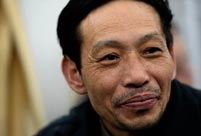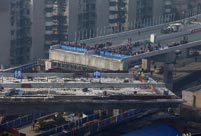 Cockfighting show staged in E. China's Heze during Spring Festival
Cockfighting show staged in E. China's Heze during Spring Festival
 Chinese New Year Flower Fair opens in San Francisco
Chinese New Year Flower Fair opens in San Francisco
 Festivities in Shanghai
Festivities in Shanghai
 PLA navy conducts drill in North China Sea
PLA navy conducts drill in North China Sea
 World's high-tech hotels
World's high-tech hotels
 Li Na poses with trophy on Brighton Beach in Melbourne
Li Na poses with trophy on Brighton Beach in Melbourne
 Six Chinese divers back safely after 300-meter saturation dive
Six Chinese divers back safely after 300-meter saturation dive
 Traditional wedding ceremony of Yao people
Traditional wedding ceremony of Yao people
 Taipei Game Show attracts geeky gamers
Taipei Game Show attracts geeky gamers
Four, improving mechanisms and institutions for the integrated development of urban and rural areas. The unbalanced development between urban and rural areas is a serious problem hindering the development of our economy and society, a major problem we must solve in order to complete the building of a moderately prosperous society in all respects and accelerate socialist modernization. Tremendous changes have taken place in China's rural areas since the reform and opening-up policy was introduced in late 1978. However, the urban-rural dual structure has not changed fundamentally, and the widening gap between urban and rural development has not been reversed. To solve these problems, we must push forward the integrated development of urban and rural areas.
The Decision sates that we must improve the mechanisms and institutions to form new relations between industry and agriculture and between urban and rural areas in which industry promotes agriculture, urban areas support rural development, agriculture and industry benefit each other, and there is integrated urban and rural development, so that the overwhelming majority of farmers can participate in the modernization process on an equal basis and share the fruits of modernization.
The Decision proposes a series of reform measures to improve the mechanisms and institutions for integrated development of urban and rural areas: One, accelerating the building of a new type of agricultural operation system. We will maintain the dominant status of family operation in agriculture; encourage the transfer of contracted land-use right to big, specialized operators, family farms, farmers' cooperatives and agricultural enterprises; encourage rural areas to develop the cooperative economy; encourage and guide industrial and commercial capital to invest in rural areas to develop modern planting and breeding industries suited for commercialized management; and allow farmers to develop industrialized operation of agriculture by becoming shareholders using their contracted land-use right, among other measures. Two, endowing farmers with more property rights. We will protect farmers' contracted land-use rights by law, safeguard the rights and interests of farmers as the members of collective economic organizations, ensure rural households' homestead usufruct, and select several pilot areas to steadily and prudently push forward the mortgage, guarantee and transfer of farmers' residential property rights. Three, promoting equal exchanges of factors of production and balanced allocation of public resources between urban and rural areas. We will ensure migrant workers receive equal pay for equal work, and ensure farmers equally share the gains from added value of land; improve the agricultural insurance system; encourage investment in rural development, and permit enterprises and social organizations to start all kinds of undertakings in rural areas; make a balanced allocation of compulsory education resources between urban and rural areas, integrate the basic old-age insurance and health-care insurance systems of urban and rural residents, and improve the balanced development of the minimum living allowance system in both urban and rural areas; and steadily make basic urban public services available to all permanent residents in cities, and incorporate farmers who have registered as urban residents into the urban housing and social security network.
Five, promoting wide, multi-tiered and institutionalized consultative democracy. Consultative democracy is a unique form and distinctive advantage of China's socialist democracy, and an important embodiment of the Party's mass line in the political field. Promoting consultative democracy is conducive to improving the people's orderly participation in political affairs, strengthening the ties between the Party and the people, and promoting scientific and democratic decision-making.
Promoting wide, multi-tiered and institutionalized consultative democracy is an important content of political restructuring as stipulated in the Decision. It stresses that, under the leadership of the Party, China will promote consultation throughout society with regard to major issues of economic and social development and practical issues closely related to the interests of the people, and adhere to the principle of consultation before policy-making and during policy implementation. We will build a consultative democracy featuring appropriate procedures and complete segments to expand the consultation channels of the organs of state power, committees of the Chinese People's Political Consultative Conference, political parties, and community-level and social organizations; conduct intensive consultations on issues relating to legislation, administration, democracy, political participation and social problems; give full play to the important role of the united front in consultative democracy, make the Chinese People's Political Consultative Conference serve as a major channel for conducting consultative democracy, improve the system of the CPPCC, specifying the contents and procedures for consultation, increase the forms of consultative democracy, and more actively carry out consultations on particular topics, and with specialists and representatives from all sectors of society, and with the relevant government departments on the handling of proposals, to improve the intensity and effectiveness of the consultations.
Six, reforming the judiciary and its operation mechanism. The judiciary is an important component of the political system. Miscarriage of justice has been a major concern of the people in recent years, and the judiciary suffers a lack of credibility largely due to its current system and operation mechanism, which need improvement.
Judiciary reform is one of the key points in deepening reform comprehensively. The Decision puts forward a series of new and related measures in the following aspects: reform of the judicial management system, unification of the management of staff, funds and properties of courts and procuratorates below the provincial level and exploration of ways to establish a judicial jurisdiction system that is appropriately separated from the administrative divisions; improvement of the mechanism for the use of judicial power; improvement of the responsibility system for handling cases by the presiding judge and the collegiate bench, by which the judges hand down verdicts and the collegiate bench is responsible for carrying them out; strict regulation of the procedures of sentence commuting, release on parole and medical parole; improvement of the mechanism for preventing and correcting wrong cases and the accountability system, and strict implementation of the rule banning illegal evidence; establishment of a conclusion system in accordance with the law for complaints in the form of letters and petitions involving legal issues; and abolition of the Laojiao (or re-education through labor system) and improvement of laws for the punishment and correction of unlawful and criminal acts.
These measures are of vital significance for ensuring that judicial departments independently exercise their judicial and procuratorial powers according to law, improving the judicial power operation mechanism in which rights and responsibilities are clear, improving judicial transparency and credibility, and safeguarding human rights.


 A 60-hour journey home
A 60-hour journey home Int'l Snow Sculpture Art Expo
Int'l Snow Sculpture Art Expo Highlights of China's air force
Highlights of China's air force Airline crew stage flashmob dance at Kunming airport
Airline crew stage flashmob dance at Kunming airport Top15 countries to retire to in 2014
Top15 countries to retire to in 2014 Hot supermodel's new photo album released
Hot supermodel's new photo album released Asia's heaviest box girder finishes 'rotation' in Wuhan
Asia's heaviest box girder finishes 'rotation' in Wuhan Completed facade of People's Daily new headquarters
Completed facade of People's Daily new headquarters Chinese-branded car passes North America standard safety test for the first time
Chinese-branded car passes North America standard safety test for the first time Li Na beats Bouchard to reach Australian final
Li Na beats Bouchard to reach Australian final  Explore the sources of PM 2.5
Explore the sources of PM 2.5 Highlights of Chinese airborne troops'exercises
Highlights of Chinese airborne troops'exercises  'Living in ice house' competition held in central China
'Living in ice house' competition held in central China  Chinese figure in Oscar nominations
Chinese figure in Oscar nominations  Top ten aerospace events in China 2013
Top ten aerospace events in China 2013Day|Week|Month